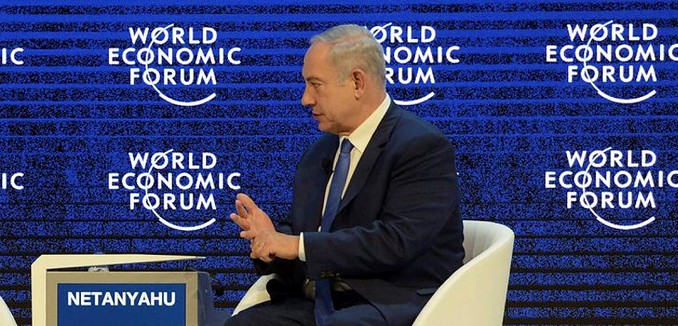The growing rapprochement between Israel and Sunni Arab states can “actually help us resolve the Israeli-Palestinian conflict,” Israeli Prime Minister Benjamin Netanyahu said in an interview with CNN host Fareed Zakaria at the World Economic Forum on Thursday.
I see the world as it is, not as I’d like it to be only, or not as we remember it nostalgically, and I work from that premise. I think Saudi Arabia recognizes today that it needs a path to reform as well, and they see, as do many in the Arab world that, they see Israel as an ally rather as an enemy, because of the two principle threats that threaten them. The first is Iran, and the second is Daesh. If you’re closer to the Persian Gulf, Iran comes first. If you move to North Africa, to Egypt, Daesh comes first. But there’s always the second. And so when they look around and they say, “Well, who can help us in this battle that threatens our very future?” Obviously Israel and these Sunni Arab states are not on opposite sides, and that’s natural.
That, I think, tells you that there’s a bigger story. I said this yesterday. I went to, with my wife, to a dinner, the opening dinner here and I met some of our European friends, including members of the EU. And I said, look, I have one request. That the EU policy shaped in Brussels, not the individual European countries but the EU policy vis-à-vis Israel and the Palestinians, merely reflect now the prevailing Arab policy to Israel and the Palestinians. And there’s a great shift taking place and it might be.
We used to think that is we solve the Palestinian-Israeli conflict it would solve the larger Israeli-Arab conflict. The more I look at it, the more I think it may be the other way around – that by nurturing these relationships that are taking place now, that could actually, with the Arab world, that could actually help us resolve the Israeli-Palestinian conflict. And we’re actually working towards that end.
Yuval Steinitz, Israel’s minister for national infrastructure, energy, and water, returned several days ago from an energy conference in the United Arab Emirates (UAE), where Jerusalem recently established a diplomatic mission. Israel’s Channel 2 suggested that the real aim of the trip may have been for the two states to covertly conduct strategy meetings.
The Wall Street Journal reported last week that Israel was actively seeking to strengthen ties with Arab powers in the wake of the nuclear deal with Iran and the rise of the so-called Islamic State. In recent months, Egypt returned its ambassador to Tel Aviv while a group of Jordanian pilots paid a “working visit” to Israel and trained closely with their Israeli counterparts during American-sponsored military exercises.
Turkish President Recep Tayyip Erdogan also recently expressed an interest in alleviating diplomatic tensions between Ankara and Jerusalem, which reached an agreement to restore relations last month. Even Sudan, a Sunni state and former ally of Iran, is said to be considering normalizing ties with Israel, a move that highlights the broader regional realignment taking place as concerns that Shiite Iran will become a nuclear power grow.
Netanyahu alluded to this shift and region-wide fears about Iran’s nuclear aspirations during an interview with Andrea Mitchell of NBC in March of last year, observing that “when Arabs and Israelis agree on something it’s worth paying attention.”
[Photo: Haim Zach / GPO ]




